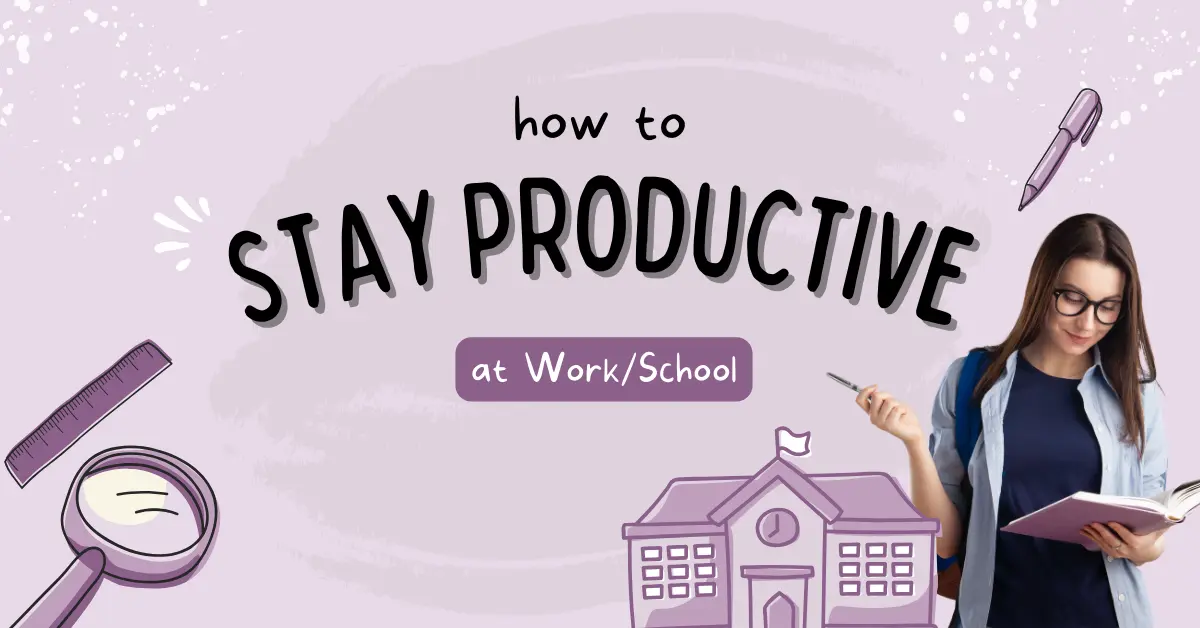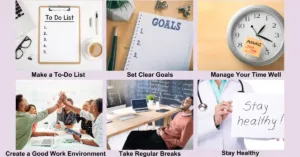
To stay productive at work or school, start by planning your tasks and setting clear goals. Break big tasks into smaller, manageable steps. Stay organized by keeping your workspace clean and using to-do lists. Avoid distractions like your phone or unnecessary websites. Take short breaks to refresh your mind, and stay focused on one task at a time. Keep a positive attitude and ask for help when needed. Finally, stay healthy by eating well, staying hydrated, and getting enough sleep. A balanced routine will help how to stay productive at work/school throughout the day.
How to Stay Productive at Work Or School
Being productive at work or school can be tough. There are so many things that can distract us or make us lose focus. But don’t worry! We’re here to help you become more productive and get more done. In this blog post, we’ll share some easy tips on how to stay productive at work/school. Whether you’re a student or a working professional, these ideas will help you make the most of your time.

Make a To-Do List
One of the best ways to stay on top of your tasks is to make a to-do list. Here’s how to do it:
- List everything you need to accomplish for the day or week.
- Prioritize the most important tasks at the top.
- Divide larger tasks into smaller, easier steps to make them more manageable.
- Cross off tasks as you finish them (it feels great!).
Making a to-do list helps you see all your tasks in one place. This way, you won’t forget anything important, and you’ll feel more organized.
Set Clear Goals
Having clear goals is key to being productive. Try this:
- Consider what goals you want to accomplish today, this week, or this month.
- Write down your goals and make sure they’re specific.
- Set deadlines for each goal.
- Make your goals challenging but still realistic.
Having clear goals gives you a clear direction, making it simpler to stay focused and motivated in your work. You know what you need to accomplish, which helps maintain your concentration and drive.
Manage Your Time Well
Good time management is crucial for productivity. Here are some tips:
- Utilize a calendar or planner to organize your tasks and schedule appointments.
- Block out specific times for different activities.
- Try the Pomodoro Technique: Work for 25 minutes, then take a 5-minute break.
- Avoid multitasking – focus on one task at a time.
By managing your time well, you’ll get more done and feel less stressed.
Create a Good Work Environment
Your environment can significantly affect your level of productivity. Try these ideas:
- Find a quiet place to work with minimal distractions.
- Make sure you have good lighting.
- Keep your workspace clean and organized.
- Keep all the necessary tools and materials close by and easily accessible.
A comfortable and organized workspace can help you focus better and work more efficiently.
Take Regular Breaks
It might sound strange, but taking breaks can make you more productive. Here’s why:
- Breaks help prevent burnout and mental fatigue.
- They give your brain a chance to rest and recharge.
- Short breaks can improve your focus when you return to work.
Consider taking a 5-10 minute break roughly every hour. Use this time to stretch, walk around, or do something you enjoy.
Stay Healthy
Your physical health plays a big role in your productivity. Keep these tips in mind:
- Get enough sleep (7-9 hours per night for most adults).
- Consume a well-balanced diet rich in fruits and vegetables.
- Exercise regularly – even a short walk can help.
- Drink plenty of water throughout the day.
When you take care of your body, your mind works better too. This leads to improved focus and productivity.

Use Technology Wisely
Technology can be both helpful and distracting. Here’s how to use it wisely:
- Use productivity apps to help you stay organized (like Trello or Asana).
- Set up website blockers to avoid time-wasting sites during work hours.
- Turn off notifications on your phone while working.
- Use apps that track your time to see where you might be wasting it.
The right tech tools can boost your productivity, but be careful not to let them become a distraction.
Learn to Say No
Sometimes, being productive means saying no to things that aren’t important. Try this:
- Prioritize your tasks and goals.
- Don’t hesitate to decline requests that don’t fit with your priorities.
- Learn to delegate tasks when possible.
- Establish limits to safeguard your time and energy.
By saying no to less important things, you’ll have more time and energy for what matters.
Find Your Productive Time
Everyone has times of day when they’re naturally more productive. Figure out yours:
- Notice the times when you feel the most awake and focused.
- Plan to tackle your most important or difficult tasks during these peak periods.
- Use your less productive times for easier tasks or breaks.
Working with your natural rhythms can help you get more done with less effort.
Stay Motivated
Keeping yourself motivated is key to long-term productivity. Here are some ideas:
- Celebrate your achievements, even the small ones.
- Remind yourself why your work or studies are important.
- Find someone to hold you accountable and support you in staying focused on your goals.
- Reward yourself when you reach your goals.
When you stay motivated, it’s easier to push through challenges and stay productive.
Minimize Distractions
Distractions can hurt your productivity. Try these tips:
- Put your phone on silent or in another room while working.
- Use noise-cancelling headphones if you’re in a noisy environment.
- Close any unneeded browser tabs and applications on your computer.
- Inform others when you require uninterrupted time to focus on your work.
The fewer distractions you have, the more you can focus on your tasks.
Take Care of Small Tasks Quickly
Small tasks can pile up and become overwhelming. Here’s a good rule:
- If a task can be completed in under 5 minutes, tackle it immediately.
- This includes things like answering a quick email or filing a document.
- Getting these small tasks out of the way quickly frees up your mind for bigger tasks.

Learn Continuously
Always try to learn and improve your skills:
- Read books or articles related to your work or studies.
- Take online courses to learn new skills.
- Ask for feedback and learn from your mistakes.
- Stay updated with new tools and techniques in your field.
The more you learn, the more efficient and productive you can become.
Use Positive Self-Talk
How you talk to yourself can affect your productivity. Try this:
- Replace negative thoughts with positive ones.
- Instead of saying, “I can’t do this,” try thinking, “This is difficult, but I can find a solution.”
- Encourage yourself like you would a friend.
Positive self-talk can boost your confidence and motivation, leading to better productivity.
Take Responsibility
Remember, your productivity is in your hands:
- Don’t blame others or make excuses for not getting things done.
- If you’re not being productive, think about why and how you can change it.
- Be honest with yourself about your habits and areas for improvement.
Taking responsibility empowers you to make positive changes and become more productive.
Conclusion
Staying productive at work or school isn’t always easy, but it’s possible. By using these tips and finding what works best for you, you can boost your productivity and achieve your goals. Remember, becoming more productive is a process. Practice patience with yourself and continue to explore different strategies until you discover what is effective for you. With practice and persistence, you’ll be amazed at how much you can accomplish.
FAQs
1. How can I plan my day to stay productive?
Start by listing important tasks. Break big tasks into smaller steps and prioritize them. Set time limits for each task to stay on track and avoid getting overwhelmed.
2. What should I do to avoid distractions?
Minimize distractions by turning off notifications and keeping your workspace tidy. Use apps or timers to focus on work for short periods, then take a quick break to recharge.
3. How can I manage big tasks without stress?
Break big tasks into smaller, easier steps. Concentrate on finishing one step at a time. This makes the task less overwhelming and helps you stay productive without feeling stressed.
4. Why is taking breaks important for productivity?
Taking short breaks helps refresh your mind, preventing burnout. A 5-10 minute break after focused work helps you stay energized and improves concentration, making you more productive in the long run.
5. How does staying healthy affect productivity?
Eating well, staying hydrated, and getting enough sleep improve focus and energy levels. A healthy routine boosts brain function and helps you stay productive throughout the day, both at work and school.
Also Read:
Good Habits for Students: A Path to Success
https://myblogpod.com/homemade-small-business-ideas-at-home/
References:
https://pmc.ncbi.nlm.nih.gov/articles/PMC4763375/
https://pmc.ncbi.nlm.nih.gov/articles/PMC5673147/
https://en.wikipedia.org/wiki/Study_skills
Disclaimer: The tips shared in this blog on staying productive at work or school are for informational purposes only. Individual results may vary. For personalized strategies, please consult a productivity expert or academic advisor.
Related post

7 Health Benefits of Assam Tea


